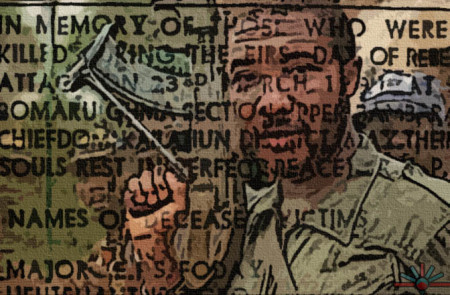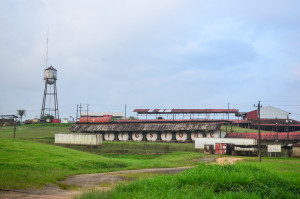By Jackie Faye April 30, 2015

Charles Taylor, Liberian warlord. ©
AK Rockefeller
Some stories are timeless. That is to say, they are so weighty and their consequences so drawn out and complex, that they can and must be told long after the events they recount took place. T. Christian Miller and Jonathan Jones’ recent ProPublica investigation of tire and rubber giant Firestone’s connection to war criminal Charles Taylor, is one of these stories. Part of a collaboration with PBS Frontline, the story details how Firestone helped the Liberian warlord rise to power during the country’s civil war 25 years ago.
The 20,000-word story, first published on November 18 and rebroadcast on Feb. 3 of this year, describes how the tire company served as a source of food, fuel, trucks and cash for Taylor’s army—many recruits were young children, often orphans. In the end, 200,000 people were killed, mostly civilians. Charles Taylor would become Liberia’s president, only later to be convicted of war crimes and sentenced to 50 years in prison—the first head of state to be convicted of crimes against humanity since the Nazis.
Miller and Jones’ investigation revealed that the American company signed a deal in 1992 to pay taxes to Taylor’s rebel government. In a single year, court records show, Firestone gave more than $2.3 million in supplies to Taylor. Hunter College honored Miller and Jones’ work with its James Aronson Award for Social Justice Journalism.
I recently sat down with Miller to find out how the pair dug up the brutal details of the story and what they hoped would result from the rehashing of events more than two decades old.
Jackie Faye: What bought this story to your attention?
Christian Miller: My colleague on the story, Jonathan Jones, had been a freelance reporter in Kenya and he had seen a little line in a book he was reading about the domination of Firestone in Liberia, and that sparked his curiosity. He began researching it and could not find any hard-hitting story about what Firestone had been doing in Liberia, where they owned the world’s largest rubber plantation. Over the next five years he started gathering documents because he thought he wanted to write a book, and in the end I think the story ended up being around 20,000 words, so, it was a very long newspaper article, but a super short book.
Faye: Why now, 25 years later?

Firestone rubber plantation, Liberia, 2013. ©jbdodane
Miller: I have covered a lot of foreign companies and I had never seen anything like the documentation that Jonathan brought to the table, and that we began to dig up in these court cases. Jonathan had a lot of State Department cables that had taken years to get and we also had this court file that nobody had looked at for years and years. This was a case where you could really document what an American company had thought about and done in a foreign country, and really that is timeless. The timing was always a question for journalism. You know it was a 25 year old story, but there are moments in journalism which are worth going back to.
Faye: Was there one finding that really drove the story?
Miller: The key was within the court file – the most important document was a signed contract on letterhead by a war criminal and a U.S. company.
Faye: How did you get your hands of all the relevant documents?
Miller: It was all on microfilm. Jonathan had filed lots of Freedom of Information Act requests, but all of it was public information.
Faye: How did you gain access to key sources and convince them to talk about such a dark topic?
Miller: I am proud of the story for the reporting effort that went into it. It was not just a document story. It was not just a people story. It was just a really good combination. And, it was astonishing how you could triangulate. An interview person would say this, the document would be in the court file, and there would be cable that would refer to it, too. For some people we called, emailed, sent letters. It was difficult to pursue and get those people to talk, but for some of the people who talked it was not only important for the reporting, but important to them as a way to unburden themselves after holding in those details for so long.
Faye: How long did it take?
Miller: After meeting Jonathan, who already had many of the documents in hand, it took us about nine months.
Faye: How did you learn about the relationship between Charles Taylor and Firestone?
Miller: There had been long-term rumors in Liberia. And when Taylor was in court he had made some references to Firestone, but it did not really get picked up at all. We knew there was some kind of relationship, but did not know the nature of what it was. The documents laid out the details.
Faye: In the story, you reference a statement from Firestone that claims, “At no time did Firestone have a collaborative relationship with Charles Taylor.” The statement goes on to say, “The company’s activities were focused on protecting its employees and property. The company had no ability to stop Taylor’s forces from using the plantation for any purposes.” Do you buy that?
Miller: My opinion about what Firestone could have done – I don’t think they could have set up an armed guard around their plantation obviously, but they could have done things like paid for the people to evacuate, arrange for buses to take them out, that was always a possibility.
Faye: Now that all the facts have come out, who do you think is to blame? What should have been done differently?
Miller: It is complicated, and I know that is not the answer anyone wants to hear. Could the United States government done things differently? Yes. They could have gotten involved much earlier to stop Taylor. Taylor has said himself that all the U.S. had to do was send in one battalion of marines and they would have surrendered. Firestone, meanwhile, has said that what they did they would do again. In other words they don’t see anything wrong with what they did. A lot of Liberians have their own opinion. A lot of them have a relationship with Firestone because it is such a big employer. And you have to think what is the alternative? Yes, Firestone may have crappy housing and it might be hard work where you don’t get paid a lot, but they are the highest paying company in the country and they offer education to the children of their employees.
In general, I think there is always going to be a bias against a big company, but it is not like Liberians are all fire-breathing Firestone haters. A lot of people see a lot of value and importance from the company. The obvious person to blame is Charles Taylor. That is the guy who killed a lot of people. We should never lose that – he is the guy who did awful things. Firestone did facilitate him. I think the evidence is pretty clear. They paid him money. They gave him supplies. Could they have left? Yes, but would that have been any better for the Liberians who stayed behind? I think that is where Liberians may say I don’t know that it would have been any better. But the real and human answer is that everyone has a role in the blame.
Faye: You did a Book Club with this story, a chapter-by-chapter discussion of the investigation with readers, how did that go?
Miller: It was a total experiment. It was fun. Hundreds of people signed up. I’m not sure we will try it again or do it differently. But, it was neat how we were able to make connections with readers. We also used WhatsApp to talk to the readers in Liberia because it is popular there. One guy reached out and thanked us for the story. He said his parents had been taken from him and killed in front of his eyes as a young boy, and a few days before our story, he said he walked into coffee shop in the Monrovia capital. Two tables down was the guy who killed his parents. The guy did not know him, but in that story you can see an image of a place where no justice has been done. In this story, he found some connection or moment to be able to say it was not just me who had experiences like this, it was the country who had experiences like this.
Faye: What outcome were you hoping to get in revealing these unsettling details so long after they occurred?
Miller: We are always looking for impact, but I did not see a high chance with this story of any new charges or anything. Because it had been 25 years, the statute of limitations had passed. In the end my goal was to preserve a moment in history that had not been told. And that is what journalism does at its best.
*****
Jackie Faye will graduate from Columbia University with a MA in business journalism in 2015. Previously, she reported in Norfolk, VA at Newschannel 3 (CBS), Raleigh, NC, at NBC-17, Columbia, SC at WIS (NBC), and Oklahoma City, OK. She has a decade of experience in journalism. Media General honored her coverage of drug shortages in 2012. After her report aired, a federal class action lawsuit was filed on behalf of cancer patients who could not access lifesaving chemotherapy drugs. She is a graduate of Georgetown University’s Institute of Political Journalism.
This entry was posted on Thursday, April 30th, 2015 at 4:56 pm. It is filed under Behind the Story, investigative journalism, Q&As and tagged with Charles Taylor, Firestone investigation, ProPublica PBS Frontline, warlord. You can follow any responses to this entry through the RSS 2.0 feed.
Comments are closed.
